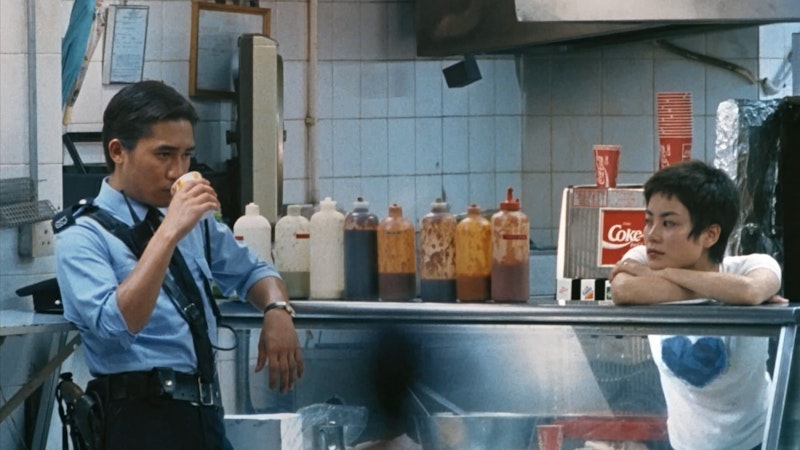Chungking Express: Wong Kar-wai’s International breakthrough was his second film in 1994: Ashes of Time was released in September after years in the making. Wong’s big budget wuxia production was cursed, bogged and eventually met with mixed reception—in the West, one rarely hears or reads about it relative to his other features. Just as Wong films like In the Mood for Love and Happy Together are much more popular and acclaimed overseas than in Hong Kong, Ashes of Time is bound by its region, context and formula. As good as it may be, Ashes of Time is not the personal and immediately recognizable work Wong is largely known for.
He made Chungking Express as a way to revitalize himself and his passion for filmmaking. He told his producing partner he needed to shoot something very fast and simple, in a matter of weeks, or, in so many words, he’d go insane. Ashes of Time was stuck in postproduction when Wong wrote, shot, edited, and released Chungking Express, which beat Ashes of Time to theaters by two months. While earlier works like As Tears Go By and Days of Being Wild found a modest arthouse audience in the United States, it was Quentin Tarantino who advocated Wong’s work and got Miramax to distribute Chungking Express; he later arranged for the film’s video release and recorded a brief introduction raving, in typical style, about the film. As Jack Hill said around the same time, “how can you not love a guy like that?”
Unfortunately, I’m in the minority: I’ve never understood the appeal of Chungking Express and I think Wong’s films are overrated, especially the inert In the Mood for Love. His best film is Fallen Angels, but he ruined it with the 2020 restoration by changing the aspect ratio from 1:85 to 2:39. Wong and cinematographer Christopher Doyle always wanted Fallen Angels presented in widescreen, with the image as it is in the 2020 re-release, but they’re wrong. That restoration is more of a massacre than George Lucas’ digital upgrades to the original Star Wars trilogy—at least that awful CGI comes and goes; with the 2020 version of Fallen Angels, the entire composition has been altered and, to my mind, ruined.
The original 1:85 version of Fallen Angels is the best display of Wong’s aptitude for varying shutter speeds, wide angle lenses, deep saturated neon colors, and pop songs as motif. Chungking Express uses “California Dreamin’” repeatedly, both diegetically and over the soundtrack; this really annoyed the packed house at the Charles last Thursday. The theater was a bit fuller than usual, probably because Chungking Express and Wong’s films are treated like Arthouse 101 in the United States; unlike a Bergman or Antonioni movie, you probably have a better chance of getting laid after a Wong film. But man, if only I’d recorded the sound of the applause that night—I couldn’t have directed “tepid verging on hostile” with such subtlety! Maybe I’m not in the minority on this one anymore…
Black Narcissus: Another Arthouse 101 example, this time from Powell & Pressburger. I’d only seen it once, about seven years ago, and it left me cold. Nuns? Impenetrable innuendo? The British? It was just a non-starter, although of course the photography is astonishing; I didn’t like The Red Shoes either, but I chalked that more up to having zero connection to the theater. I need to revisit that film, but I’ll wait for a revival, because Black Narcissus with a full crowd turned me around on it. I wasn’t surprised—I knew I was too hard on the movie when I’d seen so much less. I might prefer The Small Back Room and Peeping Tom, but Black Narcissus is undeniable, a film that deserves every iota of praise it gets.
—Follow Nicky Otis Smith on Twitter and Instagram: @nickyotissmith

